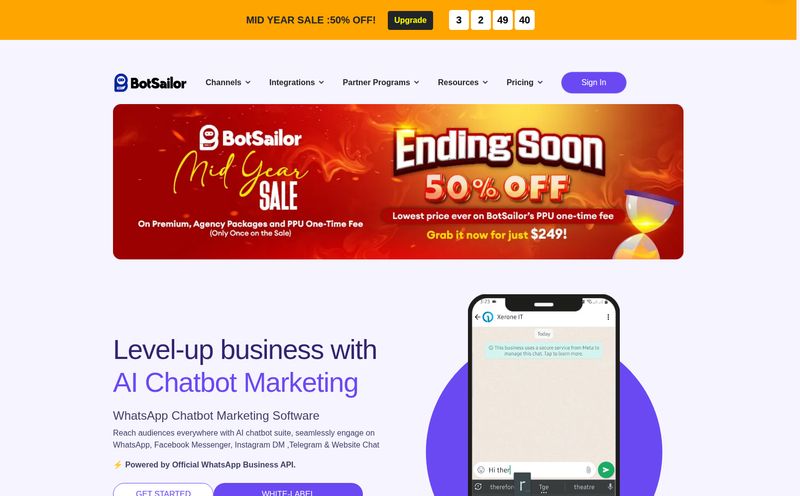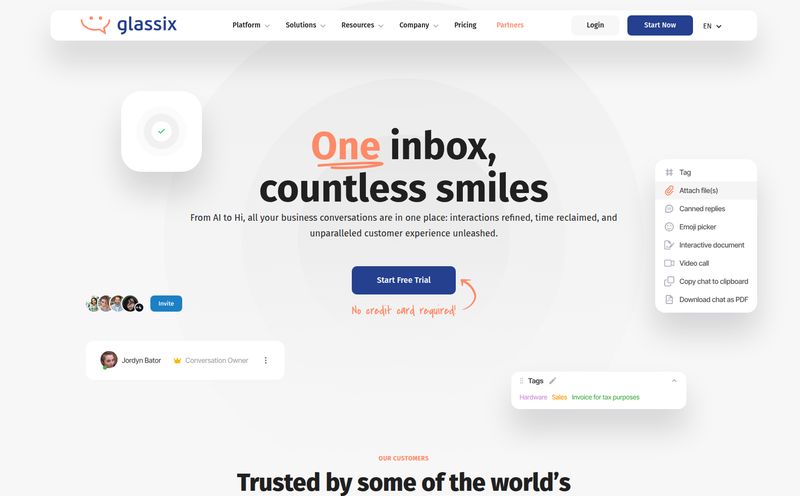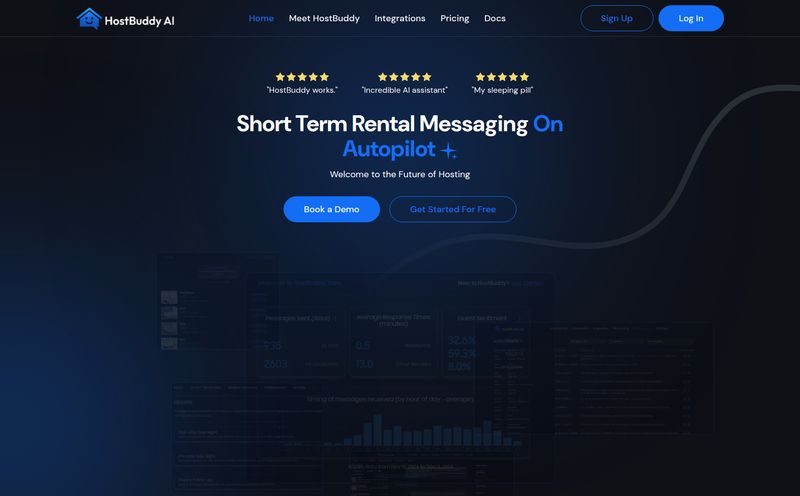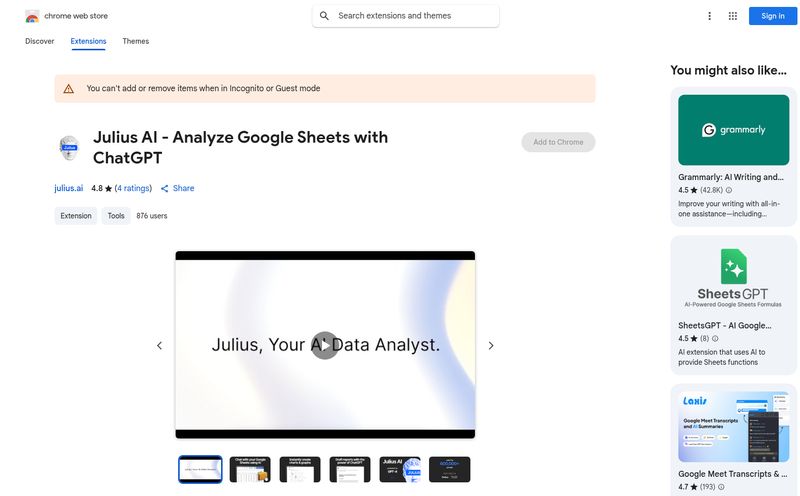If you've ever tried to find a specific Islamic ruling or the context of a particular hadith online, you know the struggle. You're immediately thrown into a whirlwind of decade-old forum posts, conflicting blog articles, and YouTube videos with, shall we say, questionable production quality. It can feel like you're trying to drink from a firehose, and half the time you're not even sure if it's clean water.
For years, I've been navigating this digital maze, both for personal knowledge and professional curiosity. As someone deep in the SEO world, I see how information gets surfaced, and honestly, it’s not always the best quality stuff that ranks. It's the stuff that plays the Google game best.
So when I stumbled upon a platform called Islam & AI, my interest was immediately piqued. The tagline on their site is bold: "The Best AI for Islam." A hefty claim. But in a world suddenly obsessed with ChatGPT and AI everything, I wondered... could this be different? Could this be the tool that finally brings organization and accessibility to 1,400 years of scholarship? I decided to roll up my sleeves and find out.
So, What Exactly is Islam & AI?
First off, this isn't just another ChatGPT clone with an Islamic-themed skin. According to their mission, Islam & AI is building a network to connect any question directly to the source texts: every ayat in the Qur'an, every hadith, historical events, and the layers of interpretation that come with them. Think of it less like a simple chatbot and more like a massive, interconnected digital library with a hyper-intelligent librarian who speaks your language. Any language, apparently.
The project has been quietly in the works for over two years, which in the fast-moving AI space, is practically a lifetime. This isn’t some weekend project someone threw together. It signals a more deliberate, thoughtful approach. And the goal is huge: to empower Islamic education globally using AI. No small feat.
A First-Hand Look at the User Experience
Landing on the homepage, the first thing I noticed was the clean, minimalist design. No clutter, no pop-up ads, no flashy banners. It's serene. There's a single search bar, inviting you to ask anything. It feels respectful, which is exactly the right tone to strike.
They provide a few "Quick Prompts" like "What is the significance of the Kaaba?" or "How can I read Quran daily?". It’s a smart move, giving new users a gentle nudge in the right direction. It helps frame the kind of queries the system is built for. It’s not just for complex fiqh issues; its also for the foundational questions that people have every single day.
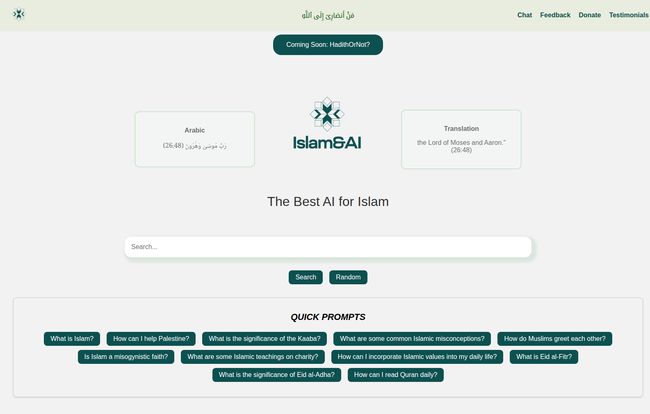
Visit Islam & AI
I decided to throw it a curveball, something a bit more nuanced than the prompts. I typed in:
What are the Islamic principles of dealing with difficult neighbors?The response was quick, and impressively, it didn't just give a single answer. It pulled relevant verses from the Qur'an and sayings of the Prophet (peace be upon him), weaving them together into a coherent response that touched on patience, kindness, and setting boundaries. It felt... helpful. Genuinely helpful.
The Engine Room: How This Thing Actually Works
This is where it gets interesting for a tech nerd like me. The platform isn't just scraping the web. It's built on a curated network of Islamic texts. This is a crucial distinction. It aims to draw its answers from the foundational sources of Islam, which theoretically should reduce the noise and misinformation so rampant on the open internet.
The multilingual capability is also a massive plus. The website itself gives examples of queries in English, French, and Urdu (using the Arabic script). In a faith that spans every continent and culture, this is not just a feature; it's a necessity. It breaks down barriers, allowing someone in Paris or Pakistan to access knowledge just as easily as someone in New York.
"Islam & AI's mission is to use the latest advancements in research, technology and design to empower humanity with the tools and knowledge about Islam and provide a new, easy and fun way for computer-assisted and global Islamic education."
This quote from their site says a lot. They’re not just building a search engine; they're trying to re-think how Islamic education can happen in our modern age.
The Big Question: Can We Really Trust an AI with Sacred Knowledge?
Okay, let's get to the elephant in the room. An AI 'alim? The idea is bound to make many people, myself included, a bit uneasy. And it should. Islamic knowledge has always been transmitted through a chain of human beings—the concept of isnad—where trust is built on the character and piety of the teacher. An algorithm has no character. It has no piety.
The creators seem aware of this. This tool isn't positioned as a replacement for scholars. I see it as a powerful starting point. It's the most sophisticated index ever created. Here’s how I’m starting to frame it in my head:
- The Pros: The potential here is undeniable. Imagine a student of knowledge being able to cross-reference dozens of tafsirs on a single verse in seconds. Think of a new Muslim who is too shy to ask a basic question at the mosque. This tool provides unprecedented access. It democratizes the initial steps of learning.
- The Cons: We have to be brutally honest about the risks. AI can 'hallucinate'—make things up with complete confidence. It can inherit biases from its training data. The interpretation of sacred texts is a nuanced, spiritual, and deeply human endeavor. Relying solely on an AI for a fatwa would be irresponsible.
My take? This is a compass, not the destination. It can point you in the right direction, show you the relevant texts, and give you a fantastic overview. But for deep understanding and personal guidance, you still need to walk the path yourself and consult with qualified, human teachers. The platform itself requires careful moderation and verification of its outputs, a challenge the developers will constantly have to manage.
The Community-Driven Heart of the Project
Here’s what really sold me on the project's integrity: the business model. Or rather, the lack of one. Islam & AI is funded entirely by donations. You can contribute via Stripe, bank transfer, and even cryptocurrency. This isn't a slick, VC-backed startup from Silicon Valley looking to monetize religion.
This feels like a grassroots, community-built project. A digital waqf, or endowment, for the 21st century. They are building something for the ummah, funded by the ummah. It changes the entire dynamic. The incentive isn't profit; it's service.
Even more telling is the button that says, "Share your expertise with us!". They're not just asking for cash; they're asking for knowledge. They're trying to build a collective of experts to contribute to the project's quality. That's a sign of humility and a genuine commitment to getting it right.
So, Who Is This Tool Really For?
I've been thinking about this a lot. Who gets the most out of Islam & AI? I think the audience is surprisingly broad.
It's for the student of knowledge who needs a research assistant that never sleeps. It's for the curious non-Muslim who wants straight answers about Islam without the political or cultural baggage. It's for the revert or new Muslim who has a thousand questions and wants a safe space to ask them. It's for the parent trying to answer their child's tough questions with something more than just "because." It’s a tool for anyone who is seeking knowledge.
It acts as a bridge, connecting a person's natural curiosity with a deep well of scholarly tradition in a way that’s never been so direct.
Frequently Asked Questions about Islam & AI
Is Islam & AI a free tool?
Yes, it is completely free to use. The project is supported by community donations and is not a for-profit enterprise. They provide several options for those who wish to contribute financially to its upkeep and development.
Can I ask questions in languages other than English?
Absolutely. The platform is designed to be multilingual. The website shows examples in English, French, and Urdu, indicating a broad linguistic capability to serve the global Muslim community.
How reliable is the information from Islam & AI?
The tool is designed to pull information from core Islamic texts, which makes it a powerful research assistant. However, like any AI, it's not infallible. It should be used as a starting point for research, and for serious religious rulings or deep theological questions, one must consult with a qualified human scholar. Think of it as an incredibly knowledgeable research assistant, not a final authority.
What makes Islam & AI different from just using Google or ChatGPT?
While Google searches the open web and ChatGPT draws from a vast but general dataset, Islam & AI is specifically built on a curated network of Islamic sources. This specialized focus aims to provide more accurate, relevant, and less 'noisy' answers to questions about Islam.
Who is behind this project?
Islam & AI is a community-supported project. It is not owned by a large corporation. Its funding model is based on donations, and it even invites experts to contribute their knowledge, highlighting its grassroots and mission-driven nature.
How can I support the Islam & AI project?
You can support the project in a few ways. You can donate financially through the options on their website. You can also help by spreading the word on social media or, if you have relevant expertise, by reaching out to them to contribute to the project's knowledge base.
My Final Verdict on This New Digital Frontier
After spending a good amount of time with Islam & AI, I'm walking away cautiously optimistic. It's an ambitious, impressive, and much-needed project. The creators have approached it with the right intention—as a service to the community, not a product to be sold. Its a testament to what can be built when technology is guided by a sense of purpose.
Is it perfect? No. The reliance on AI means we, the users, must be more vigilant than ever. We must bring our critical thinking and never outsource our spiritual judgment. But as a tool to open doors, to spark curiosity, and to make a vast ocean of knowledge more navigable, Islam & AI is a remarkable step forward. It's a project I'll be watching closely, and frankly, one I'll be using myself.
Reference and Sources
- The official website for the project: Islam & AI
- For further reading on AI bias: How to combat AI bias, World Economic Forum
- The project's GitHub profile for technical updates: Islam & AI on GitHub
